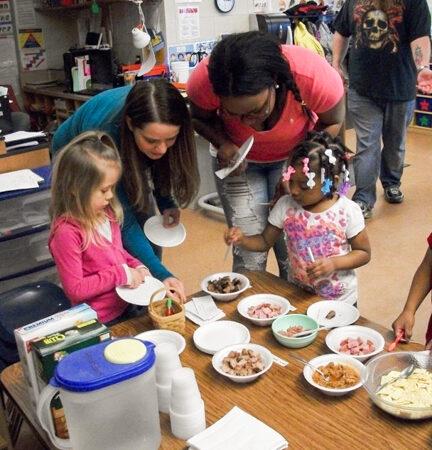
In the state of Iowa, farming is the legacy. “We are one of the largest, if not the largest, agricultural producers in the country. We supply many hogs, corn, dairy and soybeans not only to the rest of the nation, but to all nations across the globe,” says Emilee Harris, program manager for the State Public Policy Group, an Iowa-based public affairs and advocacy consulting company.
While the majority of Iowa’s farmers grow commodity crops, there is an expanding network of local food system farmers, producers and food hub managers. These growers are teaming up with early care and education providers, community-based groups and other partners to improve access to local foods for Iowa’s children and expand farm to early care and education.
Farm to early care and education connects kids with local food production by bringing farm-fresh food into early care and education settings and offering experiential learning with edible gardens, cooking and tasting fresh fruits and vegetables.
“We’re excited to help make the connection between farmers and early childhood education providers and healthy communities. More than ever, we know that Iowa farmers and locally produced healthy food must play a huge role.”
Aaron Lehman, President of the Iowa Farmers Union
A collaborative for advocacy
Trust, relationships and collaboration are the bedrock of Iowa’s success. For more than 15 years, state partners have worked together to establish farm to school programs, along with the supporting policy and infrastructure. Today, they are building upon their efforts to include farm to early care and education.
“Farm to early care and education brings people together – early childhood professionals, families, farmers and communities,” says Krista Smith, farm to early care and education coordinator for the Iowa Association for the Education of Young Children (Iowa AEYC). “It’s a uniting movement and creates a common purpose for the common good of all Iowans.”
With funding from the W.K. Kellogg Foundation, the Iowa Farmers Union is partnering with the Iowa AEYC, Northeast Iowa Food & Fitness Initiative and Iowa State University Extension and Outreach to lead the Local Food, Healthy Kids initiative. The initiative partners aim to address the intersecting needs of Iowans – health, education and economic development – and advocate for policy solutions that support both farmers and children alike.
“Farm to early care and education allows people to feel empowered by the decisions they make and capable of investing in their own futures … whether that be the farmer who now has a new market to sell to or the child care provider or the families who now realize they can grow their own food,” said Krista, who also co-chairs the Iowa Farm to School and Early Care Coalition, which is a broad statewide network inclusive of the Local Food, Healthy Kids partners and many others.
“Farm to early care and education allows people to feel empowered by the decisions they make and capable of investing in their own futures … whether that be the farmer who now has a new market to sell to or the child care provider or the families who now realize they can grow their own food."
Krista Smith, Farm to early care and education coordinator for Iowa AEYC
Laying the groundwork
In 2019, the Local Food, Healthy Kids initiative worked with the State Public Policy Group to conduct a statewide analysis of Iowa’s food system, interviewing community members across sectors to identify barriers and opportunities for linking local food systems with early care and education providers, schools and other institutions.
Based on the research, they outlined 45 different policy recommendations for boosting supply, growing demand and improving markets. They also developed a messaging guide, hosted trainings and facilitated educational meetings with state policymakers and administrative department heads to share the findings and build support toward solutions.
Their message: By connecting children to locally grown foods, everyone benefits through a healthier populace, a strengthened local agricultural economy and a renewed relationship with community.
Having a shared understanding on all sides – supply, aggregation and demand – created the foundation for a diverse group of farmers, providers, policymakers and community members to come together around common goals.
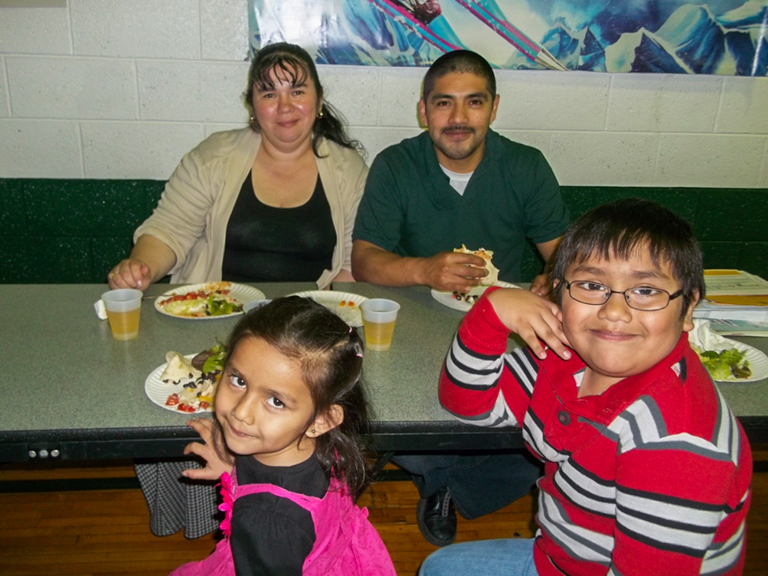
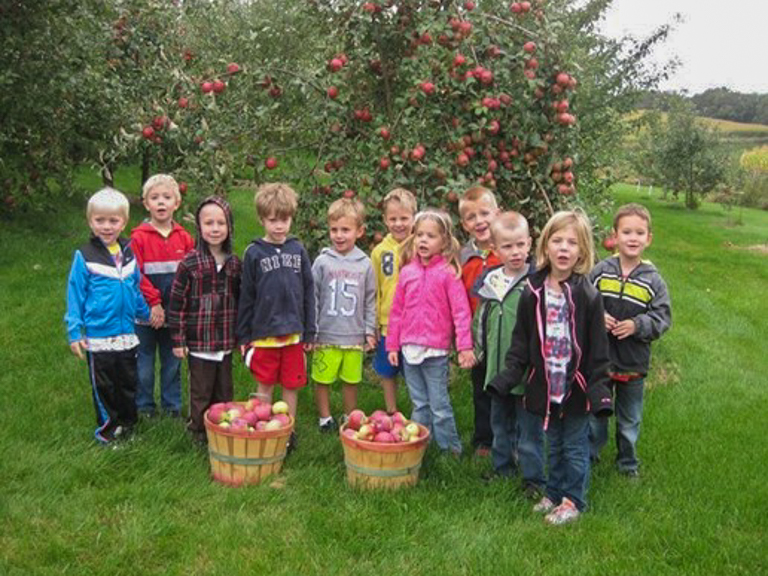
What if Iowa prioritized growing food for its children?
The potential in local food production growth could be a gamechanger for Iowan children, farmers and communities.
Opportunity on the supply side:
of all Iowa farms engaged in
local food production in 2015.
of Iowan farmers growing
local foods are beginning.*
To meet growing early care and education demand:
increase in Iowa school spending on locally sourced foods from the 2016-17 school year to 2017-18.
If Iowa farmers met just half of the consumer demand for locally grown food, it would:
in annual sales.
Support 12,000 Iowa jobs.
Data from Local Food, Healthy Kids Analysis of Iowa’s Food System: Opportunities and Policy Recommendations, 2017.
*USDA defines beginning farmers as operating less than 10 years and owning farms that are not greater than 30% of the average county farm.
Celebrating wins
Building from this foundation, the Local Food, Healthy Kids initiative partners and State Public Policy Group went to work on advocating for change at the state level. They started with educating policymakers on five of the 45 recommendations outlined in the statewide analysis. Of those five, three resulted in new policies that are now in motion across the state.
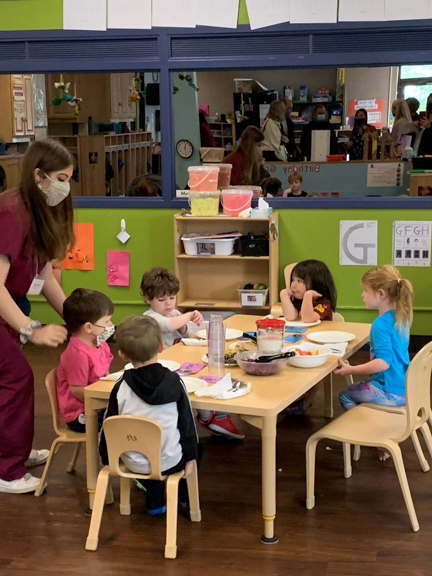
Systems change at the policy level is just as important as the on-the-ground work connecting directly with families, farmers and early care providers. “It is long-term work. It’s not a decade, it’s a generation,” says Ann Mansfield, program coordinator at Northeast Iowa Food & Fitness Initiative, who has been working on farm to school for 15 years.
Successful new policies included funding to launch the “Local Produce and Protein Program” for child care centers, schools and universities to buy produce, meat, eggs and dairy from local producers, food hubs and farmers; grant monies for small-scale meat processors to expand and meet local demand; and the establishment of a farm to school fund.
“We were able to develop policy solutions that came out successful because they were reflective of the community and responsive to the community,” Emilee says.
Proven strategies to connect early child care centers and local farmers
This community-centered approach is also a hallmark of the Iowa Farm to School and Early Care Coalition. Through incentives, train-the-trainer and partnerships, the coalition is strengthening connections between early care and education providers and local farmers.
For example, a statewide pilot program, “Local Food Makes Cents,” launched this past year to ensure critical nutrition support gets to young children, while creating new markets for small farmers. Fashioned after Michigan’s 10 Cents a Meal for Kids and Farmers, the program incentivizes early care and education providers enrolled in the federal Child and Adult Care Food Program (CACFP) to purchase Iowa-grown fruits and vegetables. Leveraging funding from the Association of State Public Health Nutritionists, the program granted $43,000 to providers across the state, reimbursing them 10 cents per meal for incorporating locally sourced foods.
To help providers with navigating local food procurement, Iowa State University Extension and Outreach created a train-the-trainer curriculum. Ten coaches are now fully trained to work with providers and schools.
“They walk them through the USDA farm to school process of setting up a team, setting their goals for procurement, working things out and putting it on the menu, finding the farmers, doing the bidding,” explains Teresa Wiemerslage, education extension specialist for Iowa State University Extension and Outreach. “I’m really excited about the capacity this opens up for schools and sites in the state to help them wade through the information and make those connections that they need – especially on the procurement side of their program – and to see significant increases in locally sourced foods.”
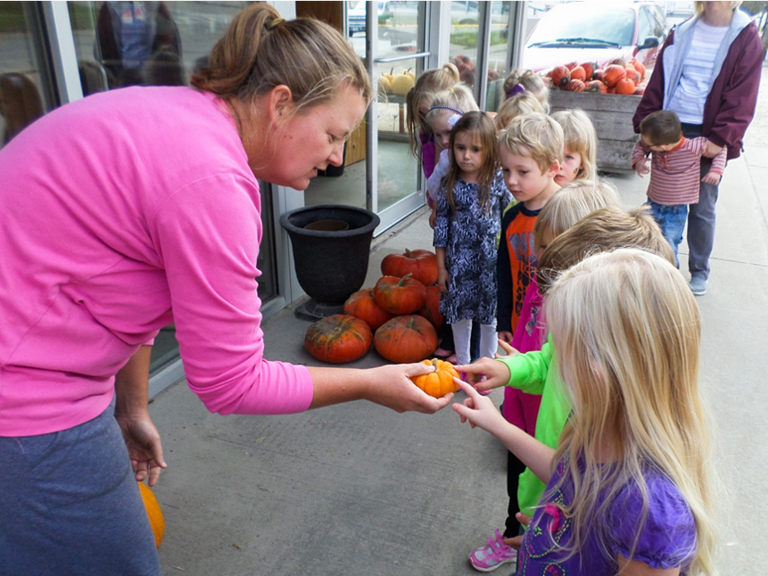
Learning together, building capacity
With the WKKF funding, Iowa AEYC has also coordinated a Learning Collaborative of 18 child care centers. Providers take part in a three-module training that includes an overview of farm to early care and education and how it benefits children, gardening and family engagement, and local food procurement. Through a partnership with the Iowa Department of Human Services, providers can receive credit for completing the training.
To make it more accessible and extend the reach, Iowa AEYC is now working to convert the training to an online program and develop a train-the-trainer model. “We’ll be able to lead the train-the-trainers program for our Child Care Resource and Referral consultants so they can actually go regionally and lead this training on their own,” says Krista. “We’ll then connect them with the local food coaches to extend regional assistance in procuring locally. It’s going to have a big ripple effect.”
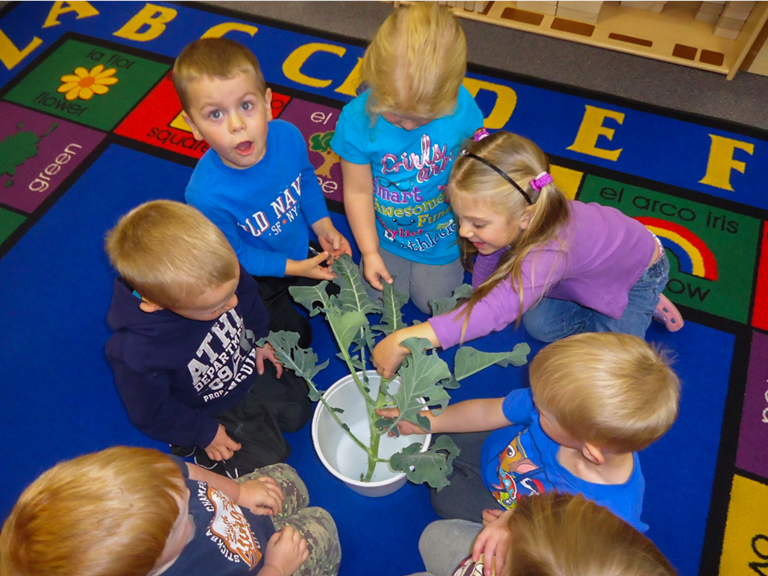
Partnerships power long-term change
“To see farm to early care and education really work, you need cross-sector partners working together,” says Arlene Enderton, program assistant at Iowa State University Extension and Outreach. “You need people from the food system, people from early child care, people who are at these state agencies like the department of agriculture, education and health. They all have to be at the table.”
With all the partners involved and energy around this work, Iowa is well on its way to building local food systems across the state and improving quality early learning. The benefits for children and their families, for providers and for local farmers are spreading across the state. Haleisa Johnson, early childhood coordinator at Northeast Iowa Food & Fitness Initiative, adds,“We are able to create sustaining structures for farm to early care and education across Iowa because of the partnerships that the W.K. Kellogg Foundation has helped us foster and build, helping us to continue and grow the work in the future.”
“When you look at farm to early care and education as a whole, it’s such an amazing long-term solution to Iowa’s health problems with obesity, heart disease and diabetes,” says Krista. “Because you get kids who are healthy and mentally stronger because of the nutrition that they receive when they’re young, and because they’ve developed lifelong habits of making good food choices.”
Lessons Learned
Go to people in the community and listen – farmers, providers, community members and any person connected with or interested in farm to early care and education. “Our theory of change comes from grassworks work, going into the communities that we’re working with and talking with them. Not to just try to energize them to send a letter, but more so to get their opinion first before we even act,” Emilee says.
Take time to build relationships and trust among partner organizations and leaders. “You’ve got to have partners that you are working collaboratively with – you are willing to learn from them and they are willing to learn from you. Partnership work is really hard work, but it’s the best work. Once you get to know each other well enough that you can understand what’s in it for everyone, then the goals and the vision become a shared vision,” Ann says.
Due to the cross-sector nature of farm to early care and education work, it is necessary to have multiple leaders, experts and organizations in agriculture, health, nutrition and education who have a shared vision and goals. This type of collaborative alignment strengthens the ability to build support among constituencies across the state. “You need to fund backbone support to organize these partners and it’s really hard to find funding for that. We need funding for that formation piece of getting the partners together,” Arlene says.
Change needs to happen on all levels, including state and federal policy level. “Over 15 years, we have learned that policy, system and environmental change is important so it’s sustained,” Ann says.
The W.K. Kellogg Foundation is culminating a five-year, five-state pilot for farm to early care and education to support healthy children and equitable, sustainable food systems. This story was made possible by interviews with Iowa state partners: Iowa Association for the Education of Young Children, Iowa Farmers Union, Iowa State University Extension and Outreach, Northeast Iowa Food & Fitness Initiative and State Public Policy Group.
Explore More About Farm to Early Care and Education
Across the country, providers, local farmers, community organizations, state agencies and other partners are coming together to develop successful farm to early care and education programs.

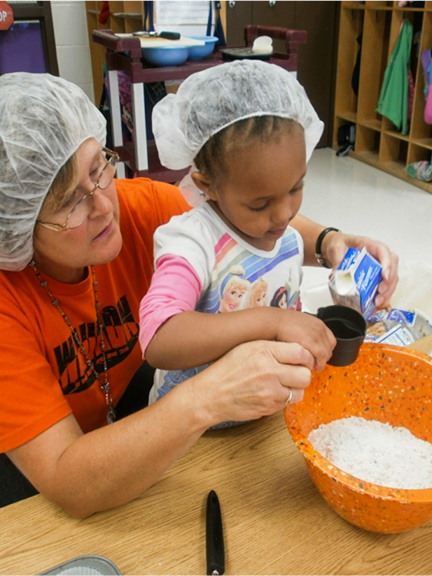
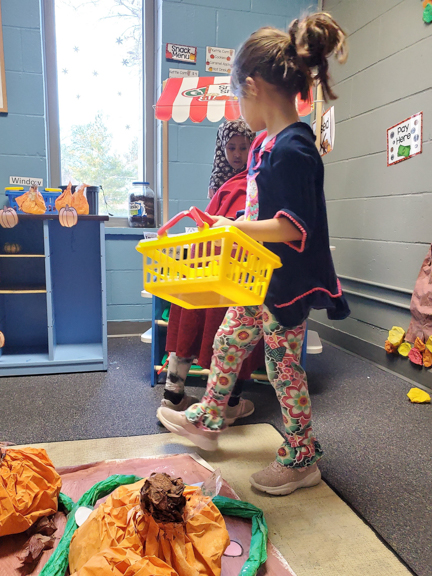
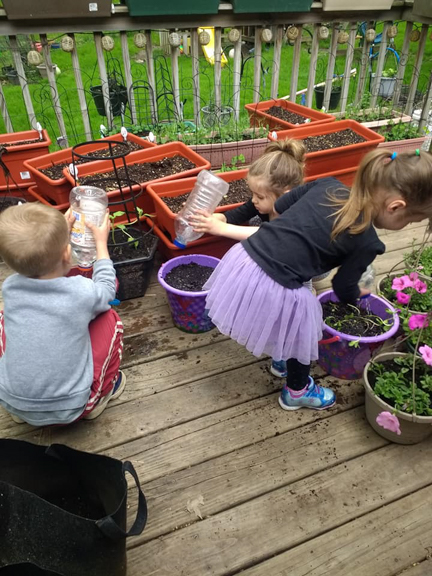
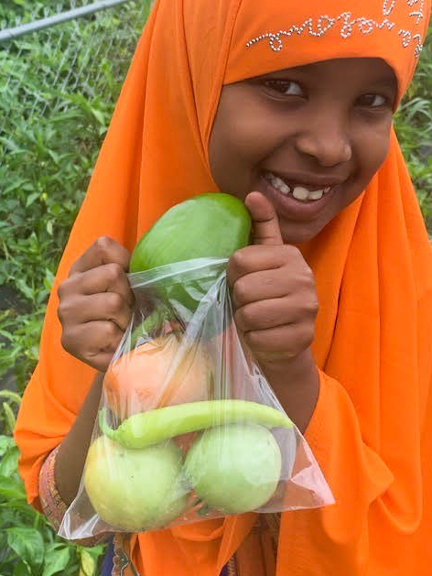
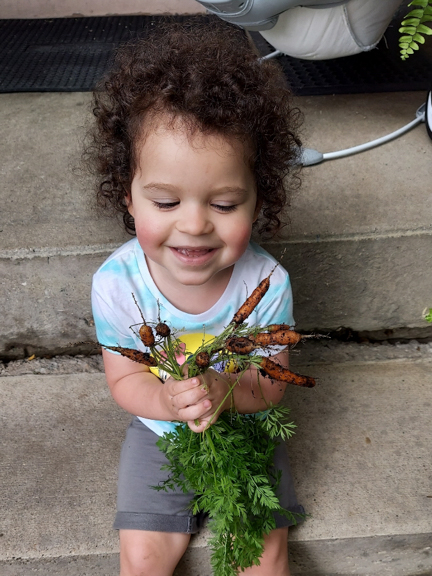
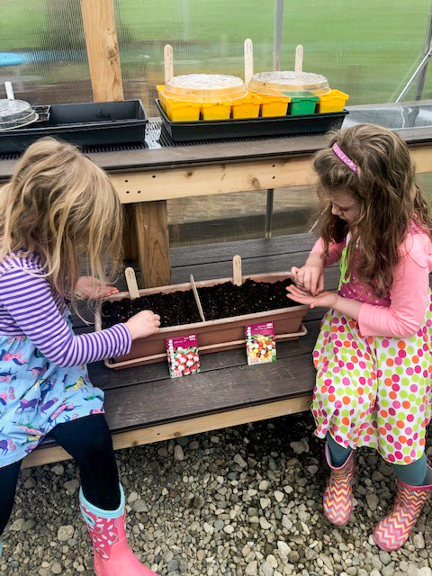

Comments